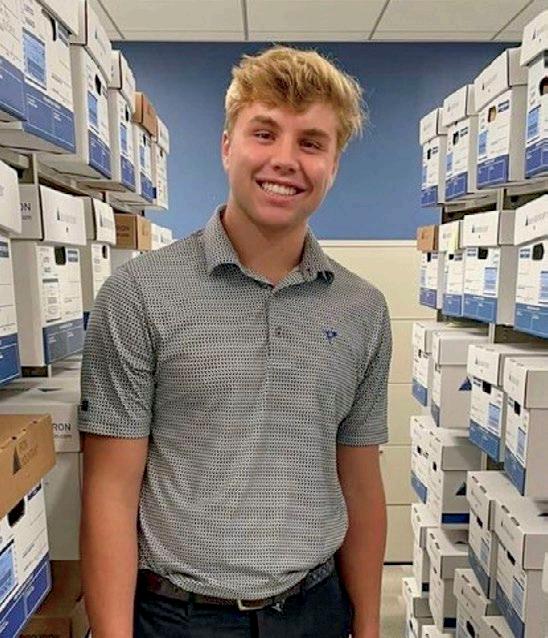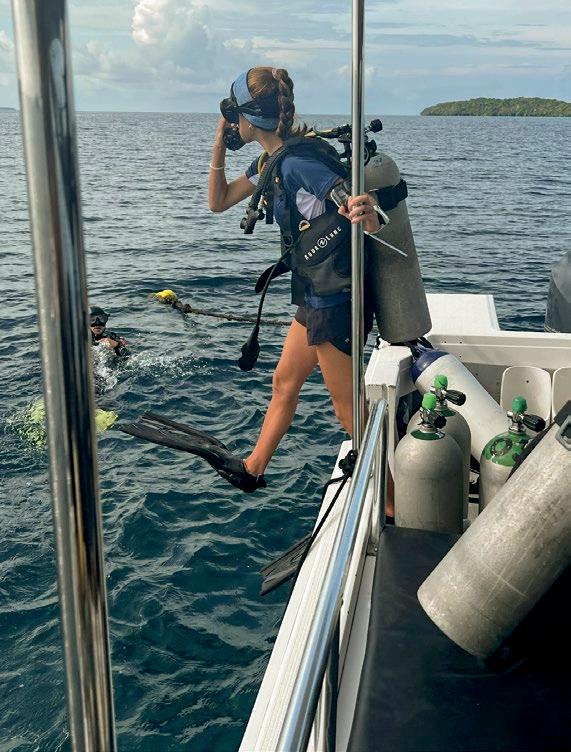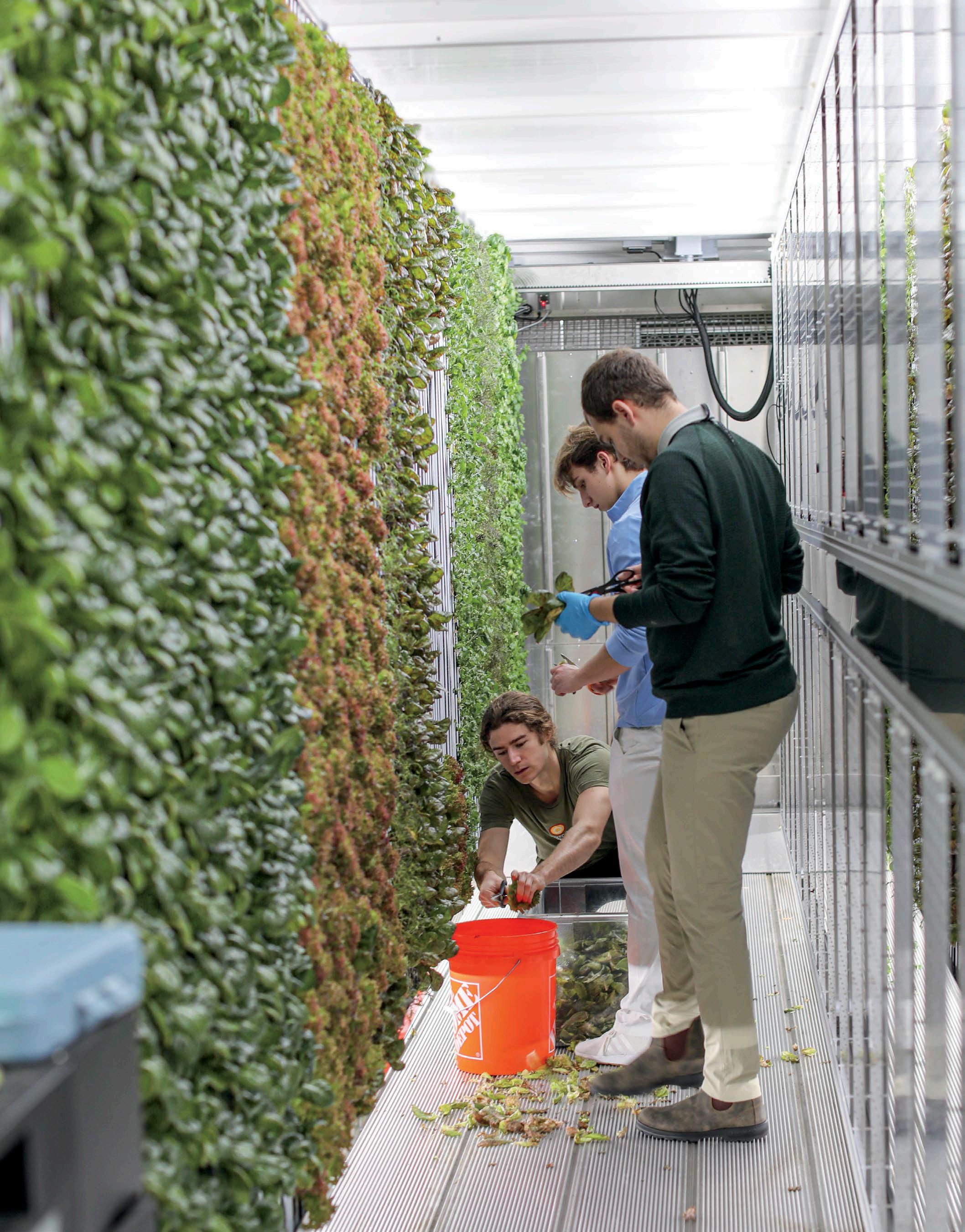
3 minute read
What are you working on?
In this series, we highlight students as they are deeply engaged in the process of learning, taking responsibility for extending their knowledge and skills, and constructing opportunities for realworld application. The following students used Intersession to pursue independent studies.
Charlie Benincasa is well-known at the legal department of United Rentals, the world’s largest rental company headquartered in Stamford. This January was his third time returning to the company for internships. Benincasa, a senior, was there during the 2022 Intersession, last summer, and again this January.
“I’ve been able to do meaningful work and that’s what keeps me going back,” says Benincasa.
Most recently, Benincasa conducted a survey of all 50 states and their rules about international driver’s licenses. There is no uniform federal standard for driving in the U.S. with a foreign license. He cross referenced his research with the policies of car rental companies and presented his research in a report, “The United States’ Driving Codes for an International Driver’s License.” Parts of the report are being used by the
United Rentals’ legal department to update terms and conditions for renting vehicles.
Benincasa is particularly interested in the intersection of business and law. In addition to his internships, last year he took Advanced Applied Constitutional Law with Paula Russo, a class that studies and simulates Supreme Court cases, and his Junior Thesis topic focused on intellectual property. This year, he is taking International Relations with Russo. Next year, Charlie plans to study Economics and Politics and International Affairs at Wake Forest University.
“GCDS has been very accommodating in letting me pursue these Intersessions for two years in a row. I’ve been able to create a relationship with United Rentals and I’ve learned so much. The experience has helped me to know what I want to do in the future.”
There’s only one flight a week to Palau, an archipelago of over 500 islands off the coast of Guam. This past January, Kendall Collier, a junior, was on one of them. Led by Dr. Julie Hartup, Director of the Micronesian Conservation Coalition, Collier traveled there with a group of marine scientists to study the manta ray population.
Collier explains that there is a micro population of manta rays in the region. Known for having the largest brain among fish species, manta rays are classified as a vulnerable species.
Collier, who is passionate about marine science, wrote her Junior Thesis on oceanography, under the supervision of Upper School Science Teacher Dr. Nikki Barratt. She pursued her interests to contact Dr. Hartup about field research opportunities.

Collier participated in 12 days of diving along with the rest of the team. She took photos and videos of the manta rays, measured them, and recorded her findings in a database. She studied what they eat, their mating practices, and travel patterns. In addition, Collier worked with scientists to help tag the manta rays, which she described as a “very particular process.”
“I have been looking at photos and videos of manta rays for years,” she said. “Now I was the one who was actually taking the pictures and swimming alongside them.”
In addition to learning about marine science, Collier appreciated learning about the culture, history, and politics of Palau. In order to preserve the local culture, Palau requires every business to be owned 51% by a Palauan, she explained.
When she returned from her travels, Collier presented “Palau Marine Ecosystem—How It’s All Connected,” to Dr. Barratt’s marine science class. “Teachers have taken an interest in my trip and what
I’ve learned. I am so glad that our school has an Intersession. If you apply your time well, there are unlimited possibilities of what you can do.”
Wouldn’t it be great to have fresh greens in your backyard in winter? Starting this year, GCDS is growing spinach and a variety of lettuce and herbs in a freight container behind the school. The effort, initiated by the Upper School Sustainability program, provides more fresh food to the Dining Hall. More importantly, however, container farming is a way for students to learn about growing food for communities to create a more sustainable local food system.
Hawkins Barratt Heitmann, a recent college graduate who studied biology, was tasked with getting the container farm up and running with the help of the Sustainability Diploma students. The school acquired the container through “Freight Farm,” an agriculture technology company that manufactures container farms with retrofitted hydroponic farming systems. Using automated temperature controls, LED lights, and a water system, containers like this one are located around the world and are able to grow produce year-round.

“Our goal is for it to be completely student run,” said Barratt Heitmann. “Students will coordinate with the Dining Hall to meet their needs as locally available produce changes.”
Senior Tyler Rosolen works closely with Barratt Heitmann on the farm— seeding, transplanting, and harvesting. Moving into the spring, he will be taking a larger role and run the farm as a student leader. Tyler will also work on the farm for his Senior Internship, a signature GCDS program during which seniors put their learning to work on a real-world problem or challenge. Recently, Tyler gave the Upper Elementary School Gardening Club a tour of the container to learn about a different way of “gardening.”
I have learned a lot not only in terms of agriculture and how to run the farm, but also about myself. When I am able to explore a passion like this and when what I’m doing is for a larger cause, I become truly dedicated and want success.” — TYLER
ROSOLEN, SENIOR










